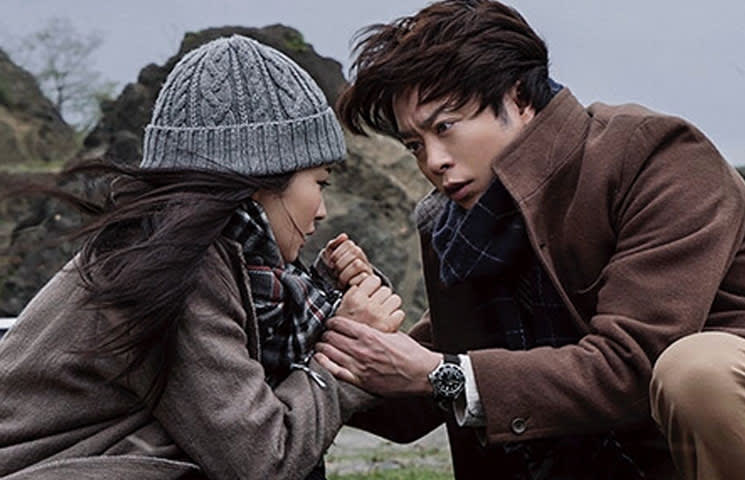Takashi Miike doesn't do anything by half-measures. When he wants to make a movie, he does it to the max, no matter how balls-to-the-wall it may be. So when Takashi Miike decides he wants to make a murder mystery drama, it's going to hit every genre convention, deliver every monologue and capture every meaningful stare. Laplace's Witch, the latest in Miike's substantial catalogue, based on the novel by Keigo Higashino, is one of his most by-the-books — and that's not really a good thing.
A downright accessible and mainstream film when compared to the mayhem of Miike's recent As the Gods Will and his earlier, blood-soaked cult classics Audition and Ichii the Killer, Laplace's Witch starts out with promise. A charmingly dorky young professor of geoscience, Aoe Shusuke (Sakurai Shô) is called to investigate when two men are found dead by hydrogen sulfide poisoning in a small resort town.
Professor Aoe is unable to explain this phenomenon, but tenacious cop Nakoka Yuji (Tamaki Hiroshi) insists that not only are the two dead men linked, they were actually murdered. Added to the mix is a strange young woman named Uhara Madoka (Hirose Suzu), who has supernatural powers she likens to the concept of "Laplace's Demon": "the precise location and momentum of every atom in the universe... can be calculated from the laws of classical mechanics." It's a fancy way of saying that Madoka can predict the future, and she's worried her friend Kento (Fukushi Sôta), who also possesses these abilities, may be dangerously intertwined in the murders as well.
It's a fascinating premise — the idea that physics can be used to predict, and therefore control, forces of nature like tornadoes and rain storms — but the concept is executed with middling results. The plot, which for the first act trots along at a reasonable pace, gets bogged down in numerous flashbacks that only serve to provide exposition and make the rest of the film a bit of a slog. And there's a lot of exposition in Laplace's Witch. Every beat is too long, and every speech is too winded — the villain gets not one, but two final monologues.
When this is presented with a touch of melodrama, we can forgive the theatrics. Unfortunately, Laplace's Witch doesn't let itself breathe. There's good chemistry between Professor Aoe, Detective Nakoka, and Madoka, who play off each other in a tight team, but the central mystery is too preposterous and far-fetched. While the mechanics of the powers that Madoka and Kento share are intriguing and unique, there's no real sense of logic to them. Madoka can do everything from direct the flight of a paper plane to throw a car at a house. Where does it end?
Miike brings his usual directorial flair to certain scenes — the final showdown in a decrepit mansion during a storm looks fantastic. There are even a few funny meta references to an eccentric director who bears more than a striking references to Miike himself. Overall, though, this is a run-of-the-mill Japanese drama thriller that could have used a bit more of that Miike edge to really make it work.
A downright accessible and mainstream film when compared to the mayhem of Miike's recent As the Gods Will and his earlier, blood-soaked cult classics Audition and Ichii the Killer, Laplace's Witch starts out with promise. A charmingly dorky young professor of geoscience, Aoe Shusuke (Sakurai Shô) is called to investigate when two men are found dead by hydrogen sulfide poisoning in a small resort town.
Professor Aoe is unable to explain this phenomenon, but tenacious cop Nakoka Yuji (Tamaki Hiroshi) insists that not only are the two dead men linked, they were actually murdered. Added to the mix is a strange young woman named Uhara Madoka (Hirose Suzu), who has supernatural powers she likens to the concept of "Laplace's Demon": "the precise location and momentum of every atom in the universe... can be calculated from the laws of classical mechanics." It's a fancy way of saying that Madoka can predict the future, and she's worried her friend Kento (Fukushi Sôta), who also possesses these abilities, may be dangerously intertwined in the murders as well.
It's a fascinating premise — the idea that physics can be used to predict, and therefore control, forces of nature like tornadoes and rain storms — but the concept is executed with middling results. The plot, which for the first act trots along at a reasonable pace, gets bogged down in numerous flashbacks that only serve to provide exposition and make the rest of the film a bit of a slog. And there's a lot of exposition in Laplace's Witch. Every beat is too long, and every speech is too winded — the villain gets not one, but two final monologues.
When this is presented with a touch of melodrama, we can forgive the theatrics. Unfortunately, Laplace's Witch doesn't let itself breathe. There's good chemistry between Professor Aoe, Detective Nakoka, and Madoka, who play off each other in a tight team, but the central mystery is too preposterous and far-fetched. While the mechanics of the powers that Madoka and Kento share are intriguing and unique, there's no real sense of logic to them. Madoka can do everything from direct the flight of a paper plane to throw a car at a house. Where does it end?
Miike brings his usual directorial flair to certain scenes — the final showdown in a decrepit mansion during a storm looks fantastic. There are even a few funny meta references to an eccentric director who bears more than a striking references to Miike himself. Overall, though, this is a run-of-the-mill Japanese drama thriller that could have used a bit more of that Miike edge to really make it work.
